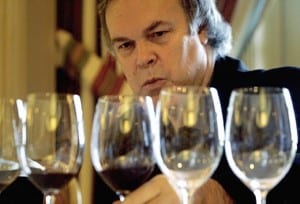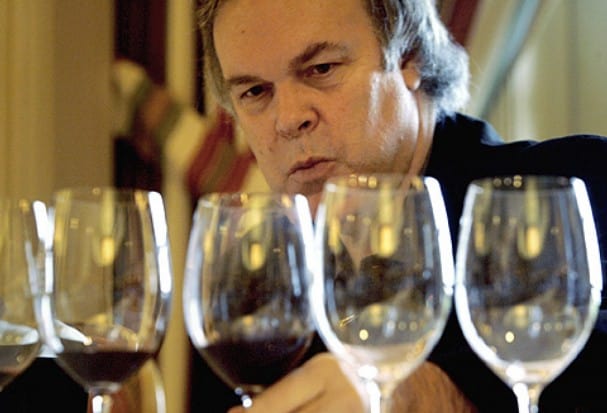
The Culinary Institute of America (CIA) today announced that its 2013 Vintners Hall of Fame inductees will be winemaking pioneer Meredith “Merry” Edwards, legendary wine writer Frank Schoonmaker, labor leader Cesar Chavez, and the founder of The Wine Advocate, Robert Parker.
The official induction of the 2013 Vintners Hall of Fame honorees will take place on February 18, 2013 at The Culinary Institute of America at Greystone, in St. Helena, California, as part of the college’s 7th Annual Vintners Hall of Fame Induction Celebration.
WATCH: Best Wine Videos
“This year’s inductees represent a broad spectrum of the wine world, and demonstrate how people from vastly different backgrounds and professions have influenced the quality and perception of California wines,” said CIA President Dr. Tim Ryan. “The Culinary Institute of America is proud to host the Vintners Hall of Fame and honor the class of 2013 for their accomplishments at making California wines so extraordinary and successful.”
In celebration of Presidents Day, a dozen California wineries will host a reception featuring wine and food pairings from White House menus. The members of the Class of 2013 will be inducted in the Vintners Hall of Fame Barrel Room after the unveiling of sculpted bronze plaques honoring those inducted in 2012. The induction ceremony will be followed by a Celebrity Chef Walk-Around Dinner in the college’s teaching kitchen. As in the past, Vintners Hall of Fame Inductees past and present will provide a selection of their wines to be enjoyed with dinner.
This year’s nominating committee, chaired by noted wine journalist W. Blake Gray, included Andy Beckstoffer, founder of Beckstoffer Vineyards (2010 Inductee); Darrell Corti, of Corti Brothers (2008 Inductee); Mike Dunne, Sacramento Bee; Randall Grahm, founder of Bonny Doon Vineyard (2010 Inductee); Carole Meredith, UC Davis Professor Emerita and co-founder of Lagier-Meredith Winery (2009 Inductee); Joel Peterson, founder of Ravenswood Winery (2011 Inductee); Charles Sullivan, wine historian and author; Paul Wagner, Vineyard & Winery Management; Warren Winiarksi, founder of Stag’s Leap Wine Cellars (2009 Inductee); and Alder Yarrow, Vinography.com. The class of 2012 was elected by 81 members of the Vintners Hall of Fame Electoral College, which consists of past inductees and members of the wine media.
ALSO SEE: Review: Restaurant Gary Danko, San Francisco
“This is another great induction class,” said W. Blake Gray. “It’s interesting to see the two most argued-about candidates of recent years, Robert Parker and Cesar Chavez, going in at the same time. I think this is a testament to the quality of discussion people have conducted online and in social media about the merits of the candidates. My only regret is, what will we argue about next year? But for this year, it’s a great celebration of a remarkable winemaker in Merry Edwards, two of the most influential writers in Parker and Frank Schoonmaker, and a reformer in Chavez, who helped unite and transform farmworkers into a crucial part of the skilled winemaking team.”
IN PHOTOS: A Salute to Wine Harvest 2012
Proceeds from the Annual Vintners Hall of Fame Induction Celebration help support the Vintners Hall of Fame and contribute to the scholarship fund for students in the Professional Wine Studies program at CIA Greystone.
2013 Vintners Hall of Fame Inductees
Meredith “Merry” Edwards
One of the first women to graduate from UC Davis’ Department of Viticulture and Enology, and the last graduate student to study with professor Maynard Amerine, Merry Edwards began her impact on the California wine industry while still a student. Her thesis on the danger of using lead in wine capsules is credited with helping end the practice.
Refusing to accept unequal treatment as a woman, she forced the university to change its job placement program for graduating enologists. Apprenticing with Dick Graff at Mount Eden Vineyards, Edwards began her pioneering clonal research that would culminate in her leading the first seminar on clones to be given at Davis, and lending her name to one of the earliest Davis clones of Pinot Noir (#37).
After helping start Matanzas Creek Winery, and holding positions at Pellegrini Family Vineyards and Liparita Cellars, Edwards went on to start her own label in 1997, focused on Pinot Noir. Edwards has been making California Pinot Noir longer than any other female winemaker in California, and longer than many men. Her wines, along with those from several other pioneers, were instrumental in proving definitively that the Russian River Valley can produce top quality Pinot. In 2007, Edwards built her own winery outside of Forestville, where she continues to make vineyard-designated Pinot Noirs as well as one of California’s most lauded Sauvignon Blancs.
Frank Schoonmaker
More than any other individual, Frank Schoonmaker was responsible for a revolution in the perception of California wine. In the late 1930s and ’40s, as a writer and businessman, he worked to bring reality to the California wine label. In his words, to upgrade the poor popular perception of California wine, “. . . there was only one way. . . nomenclature.”
His career as a wine writer began with a series of articles in The New Yorker, later combined in 1934 in the Complete Wine Book, which had little good to say about California wine. Later he spent a month touring California wine country, finding numerous producers of excellent wines. War was coming to Europe, and its flow of wine to America would soon end. He moved to fill the gap, but not with wines labeled “Burgundy” or “Chablis.” He insisted that the wines he sold identify the grape variety and the geographical source: nomenclature.
His first find in 1939 was Wente Livermore Valley Sauvignon Blanc. Inglenook, BV, Fountaingrove and Louis Martini soon followed. He never let up in his campaign, which was long resisted by many in the California wine industry. His tenacious advocacy of varietal labeling and the use of appellations of origin eventually won the day in the 1970s. Thomas Pinney, in his book The Makers of American Wines, wrote that Schoonmaker “gave a new identity” to California wine.
Cesar Chavez
Latino farmworkers are an integral part of the viticultural team that produces the great wines of California, and Cesar Chavez was their acknowledged leader.
Over the last 40 years these farmworkers have evolved immensely from seasonal unskilled laborers to highly skilled full-time members of the grape-growing community. Cesar Chavez and the United Farm Workers union forced grape-growing companies across the state to recognize the importance of farmworkers’ contribution to the world of wine. Chavez was instrumental in the creation and passing of the California Agricultural Labor Relations act, which extended collective bargaining rights to farmworkers.
In so doing, Chavez helped bring attention to farmworkers’ impressive skills and lifelong commitment to the wine industry. His ability to bring vision and voice to this underserved population in California began a movement that is still in process today, as members of the Latino population start wineries, manage vineyards, and take other important roles in the wine industry.
While he is as controversial as many of the winemakers of California, Cesar Chavez changed the way farmworkers were perceived in California, and there is no doubt that the grapes and wines of our state have reaped the benefits of his activities.
Robert Parker
Robert Parker is not only the most powerful critic in the history of wine, but arguably the most powerful critic in any field in his era, with the ability to make the fortunes of obscure wineries overnight with just a paragraph in his newsletter. Parker has been a tremendous, long-standing booster of California wine, and his attention has unquestionably been a boon for the California wine industry.
Parker’s early-career criticisms of California wines that were poor attempts to copy French styles encouraged the entire industry to improve its appeal. Unlike other critics, Parker would not politely ignore badly made wines from big name wineries. His single-minded focus on the taste of wines rewarded wineries that improved their hygiene and technology.
Parker has always been a champion of small wineries, and his tendency against holding one region above another has helped California wines to compete on the world stage. In a field where many critics work on both sides of the business, his personal ethics have withstood years of intense scrutiny.
Powerful, fair and honest, Robert Parker has been a truly great critic and an undeniably net positive influence on California wine.


